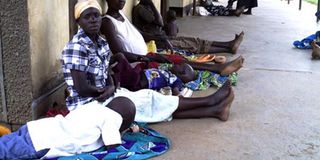Prime
Atutur Hospital: Running without water for a year

Patients lie outside a ward at Atutur Hospital. For more than a year, the public referral facility in eastern Uganda has been grappling with numerous challenges including lack of water and better equipment.
What you need to know:
Substandard? According to health officials, the medical facility is meant to be a highway referral unit but is highly lacking in standards required of it to be able to perform its roles well.
Kumi
The adage “water is life” sounds unique to some people who often seek medical care at Atutur Hospital in Teso sub-region. For one year, Atutur Hospital, one of the public referral facilities in eastern Uganda, has been grappling with numerous challenges, including lack of water and better equipment.
The water system at the hospital has since been dysfunctional and just when the spare parts were purchased early this year, Umeme disconnected power supply to the water pumping plant. Authorities at the hospital, whose sewerage system is entirely waterborne, are in a dilemma and now spend at least Shs50,000 on water purchase each day.
“The problems affecting the hospital are many. Some casual workers have not been paid for over a year. There is no water and we are trying to look into ways of helping the facility operate normally,” Kumi District Health Officer, John Opolot said. He said the hospital is meant to be a highway referral facility but is still lacking in standards required of it to be able to perform its roles well.
How important water is
An estimated 500 litres of water are required for proper running of the hospital’s needs associated with water each day but the administration is only able to secure 100 litres. “There are standards required for effective control of infections at a health unit and the water crisis is making it difficult for us to achieve this,” the senior nursing officer, Sr Berna Isale, said.
She said the hospital has been able to control infections resulting from shortage of water through health education on better hygiene practices by the patients and their attendants, quality of core health services and maintaining standards of cleaning. “Water is very vital in a big health facility like this one. Poor management of the crisis can lead to a serious disease outbreak,” Sr Isale said.
The hospital largely serves the rural population in Bukedea, Kumi, Ngora and Pallisa districts but it is understaffed and the infrastructure has been poorly maintained. Previously meant to be a 100-bed health unit, the services at the hospital have since been overstretched and the facility can no longer handle the mounting pressure.
Mr Fred Malinga the hospital administrator said: “There are only four wards at the hospital and yet more patients are admitted every day. The hospital is supposed to have 190 staff but only 82 have been posted here.” Delivery of health services at the Hospital, located about 40km on the Mbale - Soroti highway has also been hampered by dilapidated old equipment that are in a sorry state, including the theatre machines.
In 2007, the Atutur Hospital Support Network was set up to support staff training and help in the redevelopment of the hospital in relation to infrastructure and equipment with help from Sheffield Medical Group (SMG), a UK charity but these have since stopped the aid.
Mr Malinga said the hospital requires
Shs18 million to reinstate water supply at the facility and put some of the immediate needs in place.
“We have been advised to secure a three phase meter for electricity and also upgrade the water pumping equipment but the funds are not there,” Mr Malinga said.




